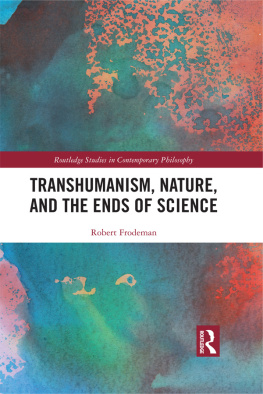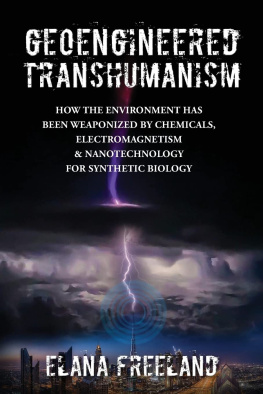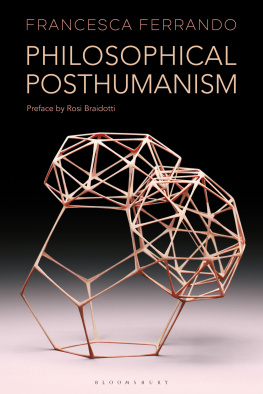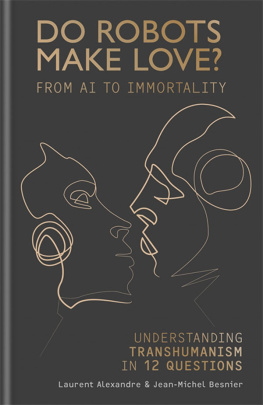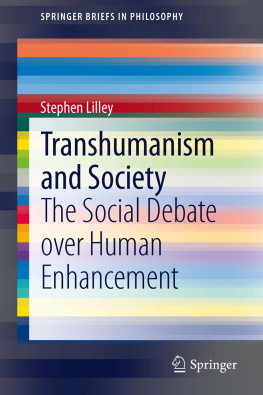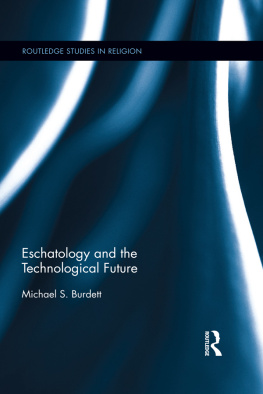Transhumanism, Nature, and the Ends of Science
Humanity and nature have been defended on many sides from the onslaught of science and technology, but in this book Frodeman expertly confronts what is arguably the greatest challenge of them all, transhumanism.
Steve Fuller, Author of Humanity 2.0, University of Warwick, UK
For a long time, Ive had misgivings about the transhumanist project. This book has helped me understand why. This is a deep and important book. We owe it to ourselves to take seriously as we rush headlong into a hyper-technological future.
David Livingstone Smith, University of New England, USA
This book offers a social, political, and aesthetic critique of transhumanism and of the accelerating growth of scientific knowledge generally. Rather than improving our lives, science and technology today increasingly leave us debilitated and infantilized. It is time to restrain the runaway ambitions of technoscientific knowledge.
The transhumanist goal of human enhancement encapsulates a range of dangerous social pathologies. Like transhumanism itself, these pathologies are rooted in, or in reaction to, the ethos of more. Its a cultural love affair with excess, which is prompted by the libertarian standards of our cultural productions. But the attempt to live at the speed of an electron is destined for failure.
In response, the author offers a naturalistic account of human flourishing where we attend to the natural rhythms of life. The interdisciplinary orientation of Transhumanism, Nature, and the Ends of Science makes it relevant to scholars and students across a wide range of disciplines, including social and political philosophy, philosophy of technology, science and technology studies, environmental studies, and public policy.
Robert Frodeman is Professor of Philosophy at the University of North Texas. He is the author and/or editor of 16 books, including the Oxford Handbook of Interdisciplinarity, Sustainable Knowledge: A Theory of Interdisciplinarity, and Socrates Tenured: The Institutions of 21st Century Philosophy (with Adam Briggle).
Routledge Studies in Contemporary Philosophy
Epiphenomenal Mind
An Integrated Outlook on Sensations, Beliefs, and Pleasure
William S. Robinson
The Meanings of Violence
From Critical Theory to Biopolitics
Edited by Gavin Rae and Emma Ingala
A Defense of Simulated Experience
New Noble Lies
Mark Silcox
The Act and Object of Judgment
Historical and Philosophical Perspectives
Edited by Brian Ball and Christoph Schuringa
Perception, Cognition and Aesthetics
Edited by Dena Shottenkirk, Manuel Curado and Steven S. Gouveia
Philosophical Perspectives on Moral and Civic Education
Shaping Citizens and Their Schools
Edited by Colin Macleod and Christine Tappolet
Explanation in Action Theory and Historiography
Causal and Teleological Approaches
Edited by Gunnar Schumann
Spatial Senses
Philosophy of Perception in an Age of Science
Edited by Tony Cheng, Ophelia Deroy, and Charles Spence
Transhumanism, Nature, and the Ends of Science
Robert Frodeman
For more information about this series, please visit: www.routledge.com/Routledge-Studies-in-Contemporary-Philosophy/book-series/SE0720
Transhumanism, Nature, and the Ends of Science
Robert Frodeman

First published 2019
by Routledge
52 Vanderbilt Avenue, New York, NY 10017
and by Routledge
2 Park Square, Milton Park, Abingdon, Oxon OX14 4RN
Routledge is an imprint of the Taylor & Francis Group, an informa business
2019 Taylor & Francis
The right of Robert Frodeman to be identified as author of this work has been asserted by him in accordance with sections 77 and 78 of the Copyright, Designs and Patents Act 1988.
All rights reserved. No part of this book may be reprinted or reproduced or utilised in any form or by any electronic, mechanical, or other means, now known or hereafter invented, including photocopying and recording, or in any information storage or retrieval system, without permission in writing from the publishers.
Trademark notice: Product or corporate names may be trademarks or registered trademarks, and are used only for identification and explanation without intent to infringe.
Library of Congress Cataloging-in-Publication Data
Names: Frodeman, Robert, author.
Title: Transhumanism and nature: a critique of technoscience / Robert Frodeman.
Description: New York : Taylor & Francis, 2019. | Series: Routledge studies in contemporary philosophy; 123 | Includes bibliographical references and index.
Identifiers: LCCN 2019012776 | ISBN 9780367189396 (hardback)
Subjects: LCSH: Transhumanism. | TechnologyPhilosophy. | TechnologySocial aspects. | SciencePhilosophy. | ScienceSocial aspects. | Philosophical anthropology. | Nature.
Classification: LCC B821 .F71528 2019 | DDC 144dc23
LC record available at https://lccn.loc.gov/2019012776
ISBN: 978-0-367-18939-6 (hbk)
ISBN: 978-0-429-19936-3 (ebk)
Typeset in Sabon
by Apex CoVantage, LLC
The human condition is such that pain and effort are not just symptoms which can be removed without changing life itself; they are rather the modes in which life itself, together with the necessity to which it is bound, makes itself felt. For mortals, the easy life of the gods would be a lifeless life.
Hannah Arendt
Contents
Excursus I
The Practice of Philosophy in the 21st Century
Excursus II
Philosophy, Rhetoric, Policy
It is only when you take your ethics for granted that all problems emerge as problems of technique.
Louis Hartz
In 2002, Columbia Universitys Center for Science, Policy, and Outcomes held a conference titled Living with the Genie. The goal of the meeting was described as the development of a new social contract between the scientific community and society as a whole. Talk of a social contract between science and society was common in those days. But the governing metaphor of the conference hinted at greater anxieties.
Genie, or jinn, are intelligent spirits or demons endowed with magical powers. They are human-like in their capacity for good and evil. Theyre tricksters who provide surprising and often unwelcome results. The conference, then, was centrally concerned with technological determinism and the fear of nasty surprises. Can we control the genie of science and technology? Or should we admit that we are its captives, just along for the ride?
The meeting included talks by Ray Kurzweil and Bill Joy. At that time, two years after Joys (in)famous article in Wired, the two men had formed a road show debating the promise versus the perils of technoscientific advance. Joys call for relinquishmentabandoning whole areas of research because of the dangers they embodywas viewed as a curious, unpalatable, and in any case impossible option for society. Kurzweil was the advocate for technoscientific advance. He was seen as a little over the tophe was already talking about the Singularitybut his was the future that most people expected, and indeed were excited about.
As Kurzweil left the stage, I approached with a question.
| Me: | You spoke eloquently of the scientific advances we can look forward to. But you dont seem to take seriously the dangers that these advances might contain. |

